The four years that Western North Carolina resident Samantha Simmons served in the U.S. Army crushed her, she says. The physical training was arduous. Her unit leadership was difficult — toxic even. She knew of colleagues who were sexually assaulted and others who died from suicide.
She also had an infant at home and wasn’t sleeping. She experienced postpartum depression, a condition that led her to feel misunderstood and unsupported in the military. Spending weeks at a time away from her child and then-partner was unbearable.
A bright spot in her life was Midsummer Knight, the horse she adopted in 2019, even though she had to wake up at 3 a.m. to muck his stalls before beginning her day as a field medic. Around her gray-dappled horse, the tumult inside her calmed. “Knight helped me navigate struggles,” she tells Xpress. “Knight helped bring me a sense of stability back.”
Today, Simmons is pursuing a degree in nursing at Haywood Community College, and Midsummer Knight boards at Blackberry Stables in Leicester. However, he’s not only helping Simmons now. He is also part of the healing process for other veterans who participate in the Man With a Horse Project, a nonprofit dedicated to equine-assisted learning and started by Asheville-based Marine Corps veteran Jake LaRue.
The equine-human bond underpins LaRue’s own healing journey. Working with horses and other veterans “is what keeps me sane,” he says. He finds the quietude and strength of horses to be grounding. “They give you immediate feedback for exactly who you are in that moment,” LaRue says. “You can’t lie to them. If they had opposable thumbs and could hold cards, you’d never win at poker. They’d call every single bluff.”
Adds Simmons, “There really are healing properties to just being with them.”
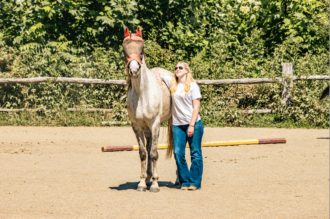
Mission for healing
LaRue’s childhood in Fort Lauderdale, Fla., featured more beaches and fishing than horseback riding. He enlisted in the Marines and studied Arabic and radio operations. After deployments in Kuwait and Somalia, he left active duty in 1992.
Then LaRue started on a downward spiral. In New Orleans, he worked as nightclub security on Bourbon Street. He calls it “an accelerated life,” with constant stimulation from the Big Easy. He became dependent on alcohol and cocaine and struggled with his mental health. He moved to Asheville 13 years ago to be closer to the Charles George Veterans Affairs Medical Center (CGVAMC) and become active in his recovery.
Around this time, LaRue met horse trainer Shannon Knapp at a silent mindfulness and meditation retreat in Hot Springs. They sat beside each other for five days without speaking. But once they did, LaRue says Knapp told him, “‘You’re a veteran. You’re on this mission for healing. Let me show you something that I’m doing.’ And she invited me out to her farm and introduced me to horses.”
Knapp is the founder of Horse Sense of the Carolinas, a 110-acre property in Marshall that is home to dozens of rescued horses. She is also executive director of the nonprofit Heart of Horse Sense, which focuses on equine-assisted psychotherapy, also called counseling with horses, and trauma-informed equine-assisted learning. Alongside her Air Force veteran husband, Richard Knapp, a licensed clinical social worker and licensed mental health counselor, they’ve served sexual assault, human trafficking and domestic violence survivors, first responders and court-involved youths.
“We became experts in trauma,” she says.
Veterans are another group that experiences trauma. According to the U.S. Department of Veterans Affairs, 29% of veterans of operations Iraqi Freedom and Enduring Freedom will experience post-traumatic stress disorder (PTSD) at some point in their lives, as will 21% of Persian Gulf War veterans. Knapp says she approached CGVAMC around 2008 and proposed working with veterans to address their emotional well-being. That work was so successful that after a few years, Heart of Horse Sense and CGVAMC established a partnership.
The nonprofit has also worked with veterans through the Veterans Healing Farm, Aura Home for Women Vets and Asheville-Buncombe Community Christian Ministry Veterans Quarters, among others. Those served include Gold Star families (the immediate families of people who died while serving in the military), survivors of military sexual trauma, combat veterans, spouses of combat veterans and spouses of veterans who died by suicide.
LaRue took Knapp up on her invitation to visit Horse Sense of the Carolinas, and he bonded so strongly with the horses that he came on as a veteran volunteer. His passion and commitment eventually got him hired to work there, which he still does. He earned a degree in social work at Western Carolina University and certifications in equine-assisted therapy and learning, or EAGALA, at Horse Sense of the Carolinas’ training program. Together, LaRue and Knapp have developed programs for Heart of Horse Sense such as Wild Bunch.
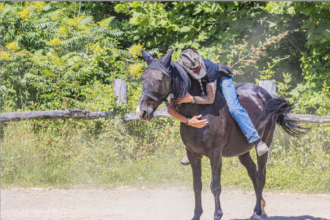
“The Wild Bunch is where we would take in horses that had never been touched,” Knapp explains. “They were basically backyard horses that no one had ever messed with. They got grain once a day, but nobody had ever touched them. … We thought, ‘We’ll take those horses and we’ll partner them with veterans for mutual healing.’”
Knapp’s instinct was spot-on. “‘This is amazing,’” LaRue recalls thinking. “It’s been so significant in my own healing process. How do I share this with other veterans?” Three years ago, he decided to start his own program pairing veterans with horses.
Wild horses
LaRue hoped to run Man With a Horse Project from Horse Sense of the Carolinas. But, Knapp says with a laugh, they already had 28 horses and no room to spare. For a time, he operated out of Shaman Hill Cultural Center in Alexander. In April, he found rental space with Full Moon Equestrian, located at Blackberry Stables, a boarding facility in Leicester.
Currently the program works with two horses, Simmons’ Midsummer Knight and LaRue’s Blackjack, as well as six lesson ponies from Blackberry Stables. But in August, they will be joined by LaRoux — yes, a horse with the same name as LaRue — and Caesar, who are both wild horses.
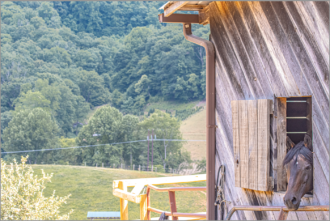
LaRue-the-human met Caesar and LaRoux-the-horse while operating retreats for Man With a Horse Project near Sand Wash Basin in Colorado, where he brings WNC-based veterans to for five-day retreats hosted with riding instructor Lori Araki from The Middle Way. Her nonprofit provides equine-assisted therapy and a horse sanctuary in Fairplay, Colo.
Sand Wash Basin is home to a herd of wild horses, also called mustangs, who live on land owned by the U.S. Department of the Interior Bureau of Land Management (BLM). According to the BLM blog, the Sand Wash Basin Herd Management Area experiences “overutilization of food and water resources” by the herd. LaRue learned that the “excess” wild horses, as they are referred to by the BLM blog, are rounded up and captured via helicopter. They are then kept in long-term holding until they are adopted or sold.
LaRoux and Caesar were captured in 2020; LaRue bid on LaRoux at auction in 2021 and met him the following year. He says he intentionally acquired LaRoux’s sibling Caesar so as not to separate the family.
LaRue became interested in the wild horses’ plight while recovering from injuries from a motorcycle accident in 2021. He learned that after being captured, the wild horses have to interact with humans, with whom they’ve previously had little to no contact and whom they perceive as apex predators. LaRue saw the experience wild horses endure as traumatizing. And as a veteran, he also found it relatable.
“In order for them to thrive in the new environment, they have to learn a different set of rules,” he tells Xpress. “They have to apply a different set of standards, they have to get along with a demographic that does not understand where they’re coming from. Veterans experience the same thing.”
LaRue adds, “And on top of that, we’re both really used to getting screwed over by the government that made a commitment to take care of us.”
‘Soul injury’
LaRue says he prefers not to think of PTSD as a clinical disorder, but as a “soul injury” that shattered pieces of his soul. He never really took to talk therapy (also known as cognitive behavioral therapy), he says, adding that many veterans share his disinclination. Some fear a stigma attached to mental health struggles, especially among a demographic extolled for being tough, while others don’t want to endure anguished remembrances, such as the experience of being wounded or the deaths of friends. LaRue also says there is a feeling that psychologists who don’t have military experience can’t relate or understand.
Wild horses are wild animals and can have a reputation for being untamable. But like veterans surviving each day with both visible and invisible trauma-inflicted wounds, they require patience. Simmons, the Army veteran, notes that Midsummer Knight had been abused by his previous owners, and he didn’t allow her to touch his face for 18 months. Wild horses aren’t necessarily untamable, LaRue explains — they have simply been free-roaming their entire lives. They need to learn to trust humans more than they follow “their instinct to flee from us.”
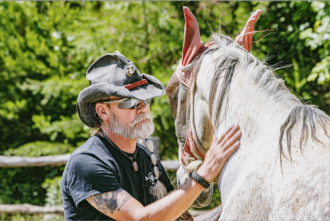
LaRoux and Caesar are sweet-tempered, LaRue says, and will be ideal for “positive reinforcement-based horsemanship,” meaning horsemanship that does not rely on force, fear and intimidation.
Veterans will strengthen their skills in self-regulation and self-control while training the mustangs on behaviors that domestic horses may take to more readily, such as being led on a lead, LaRue says. Simmons, who attended a Man With a Horse retreat in Colorado in 2023, found this work to be exactly what she needed to address her PTSD.
That’s the healing that LaRue endeavors to spread.
“Horses don’t worry about what kind of English you’re speaking,” he says. “They don’t care about your story. They don’t [think], ‘Hey, that’s that guy with PTSD, who went to jail, who got in trouble with this, who has a history of drug addiction.’ … Horses are like the ultimate Buddhists. They live in the now all the time.”



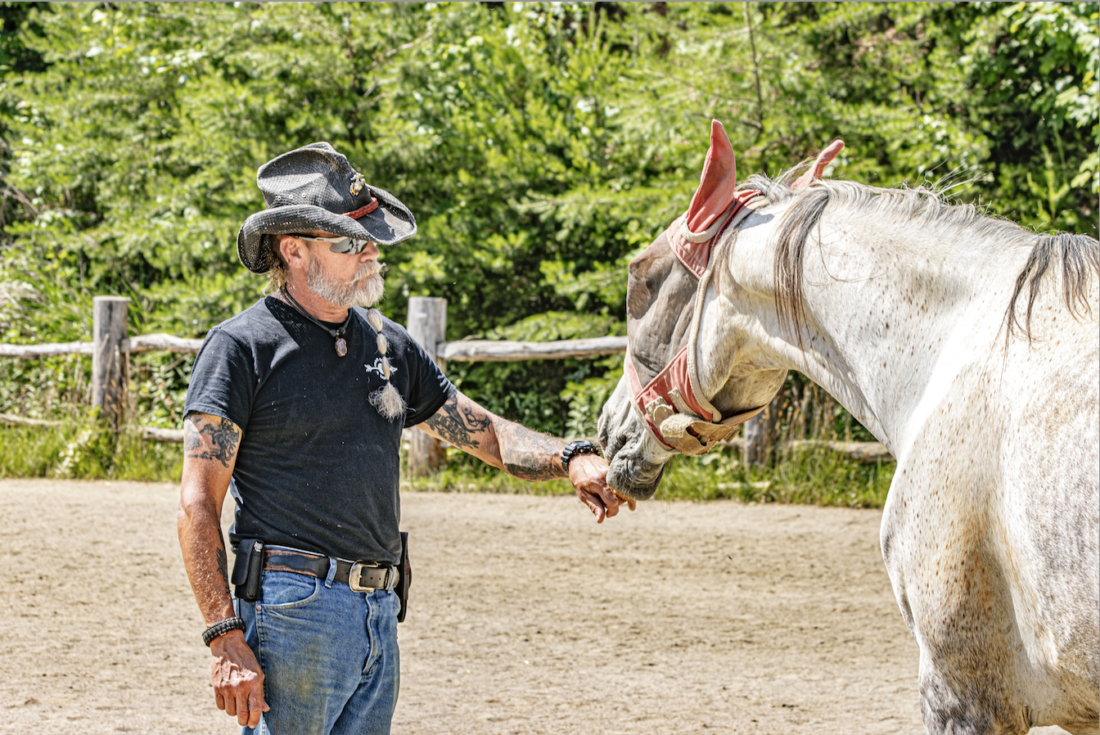


Fantastic article. Thank you Jessica and Mountain XPress for publishing this. Just reading it helped me with my service related PTSD.